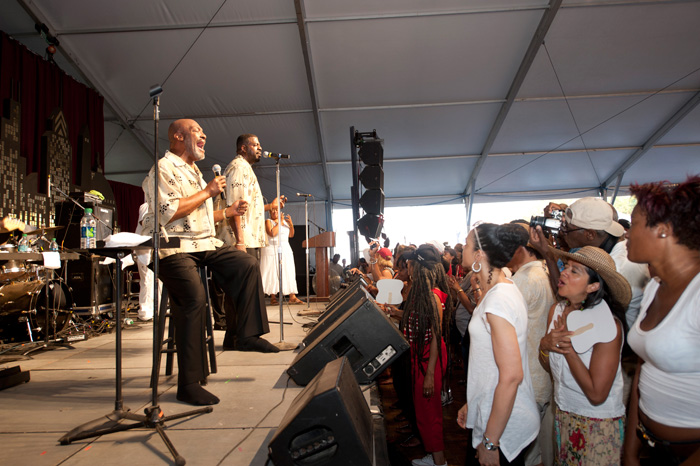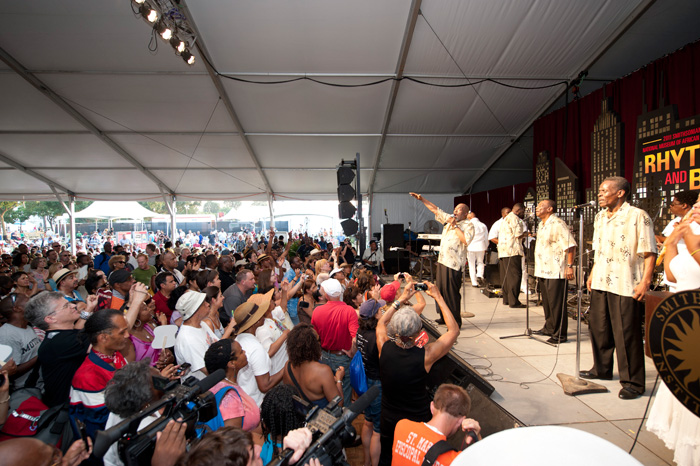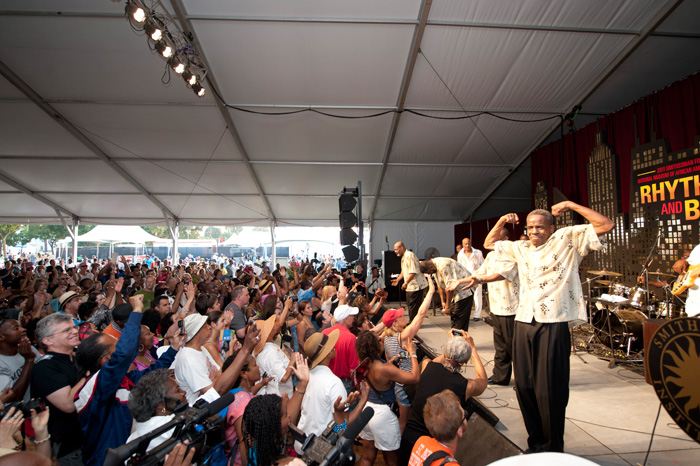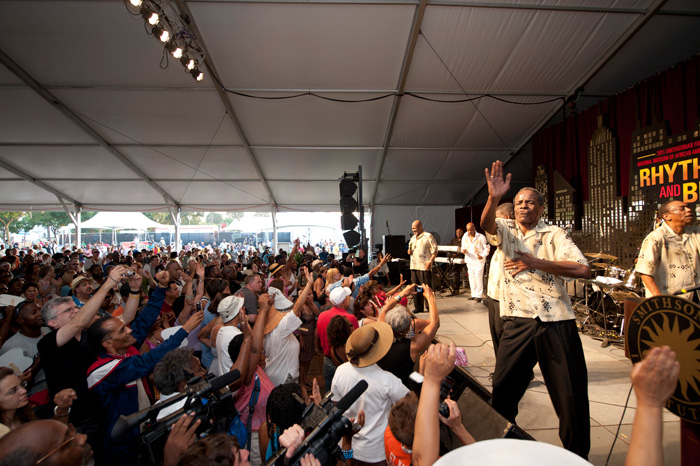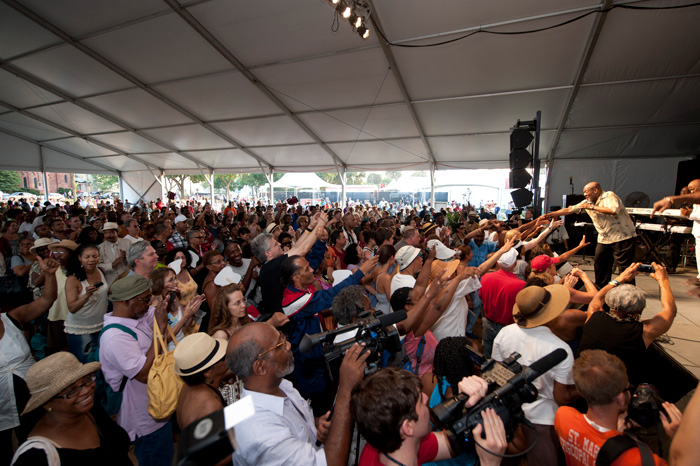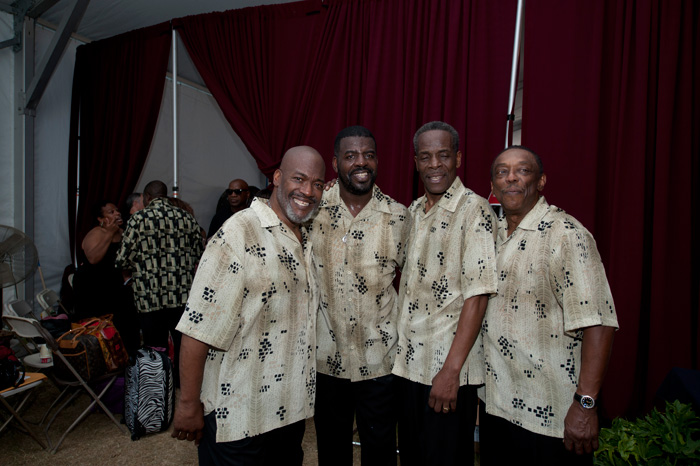Gettin’ Church with Gamble and Huff
A crowd of the faithful gathered last night at the 2011 Smithsonian Folklife Festival’s Motor City Stage, for "An Evening with Kenneth Gamble and Leon Huff/Tribute to Philadelphia International Records." In the cadences of a preacher, Dr. Rex Ellis of the National Museum of African American History and Culture called out a list of the phenomenal accomplishments of these two songwriter-producers from Philadelphia. Each time Ellis shouted the name one of the artists who worked with Gamble and Huff’s Philadelphia International Records—the Supremes, the Temptations, Aretha Franklin, Wilson Pickett, and Teddy Pendergrass, to name just a few—the audience cried out and applauded in affirmation. Volunteers handed out paper fans, and everyone fanned themselves in time with Dr. Ellis’s oration. We were gettin’ church.
In an onstage interview with Rex Ellis, the duo talked about the secrets behind their 170 gold and platinum albums, their 3500 songs, and the forty-year duration of their musical partnership. They “modeled Philadelphia International Records (PIR) after Motown,” though their sound was very different, because they were working in the era of FM radio and stereo sound, and frequently recorded with full orchestra. Motown had had to make do with AM radio and mono recording. Black radio stations such as WOL in Washington, D.C. were essential to the success of the Philadelphia sound.
The church had a strong influence on the work of Gamble and Huff; Philadelphia was known for its Gospel music, and Huff, a pianist for his church’s junior choir, grew up listening to groups like the Soul Stirrers, the Dixie Hummingbirds, and the Mighty Clouds of Joy. He often went to the Daddy Grace House of Prayer around the corner from his house. Huff said, “I can’t think of anything that has more energy and more spirit than a House of Prayer band.”
Gamble and Huff frequently begin their songwriting sessions with conversation. The first time they sat down together, they wrote seven or eight songs. As Huff said, “We had so much fun…that’s when the magic started.” After that, “There wasn’t nothing that would deviate us from our focus on the music.” They started working together in the recording studio every day. Huff said of their partnership, “in Gamble’s words it was destiny, and I believe that’s what it was.”
Rex Ellis wrapped up the interview with Gamble and Huff as if he were ending a sermon, and like a preacher building to a crescendo, intoned that “there was an anointing” when the founders of Philadelphia International Records began their work together. He exhorted the audience to give the pair a standing ovation, and the crowd jumped to its feet as one.
Showcasing some of Gamble and Huff’s best-known songs were Amazing Grace Little, who wrapped her warm, powerful contralto around every number, and the Soul Survivors, who had the audience singing along to "Expressway to Your Heart" and the perennially popular "Me and Mrs. Jones." Harold Melvin’s Blue Notes, a vocal quartet, had the house up and dancing with hits such as "If You Don’t Know Me by Now," and "Bad Love." As the concert drew to a close, and people drifted out into the warm summer evening, there was a feeling of exaltation in the air.
Ariel Fielding is a Fellow at the Folklife Festival working to increase online and community engagement. She is also a producer of culturally diverse performing arts and educational programming, with an emphasis on South Asian and Afrocentric work, and holds a M.Mus. in Ethnomusicology from the University of London.
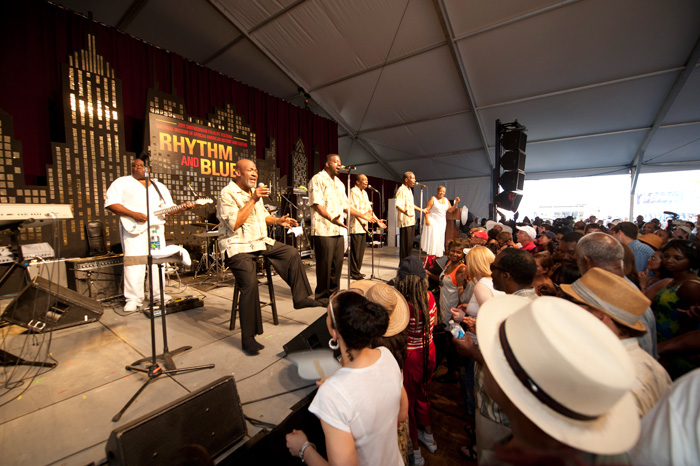
-
Photo by Walter Larrimore, Ralph Rinzler Folklife Archives
-
Photo by Walter Larrimore, Ralph Rinzler Folklife Archives
-
Photo by Walter Larrimore, Ralph Rinzler Folklife Archives
-
Photo by Walter Larrimore, Ralph Rinzler Folklife Archives
-
Photo by Walter Larrimore, Ralph Rinzler Folklife Archives
-
Photo by Walter Larrimore, Ralph Rinzler Folklife Archives
-
Photo by Walter Larrimore, Ralph Rinzler Folklife Archives
-
Photo by Walter Larrimore, Ralph Rinzler Folklife Archives
Click on the image above to check out the dynamic moves of Harold Melvin's Blue Notes.


